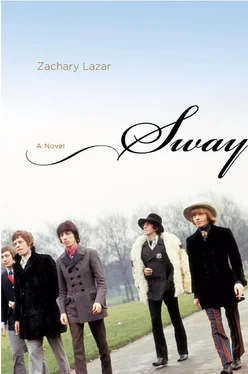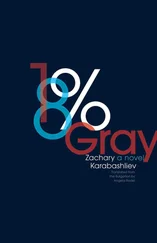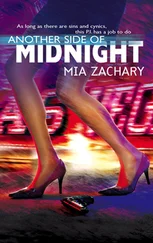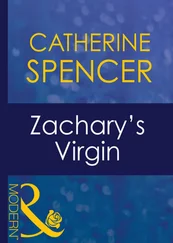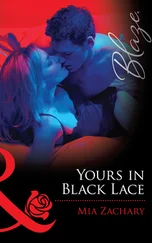He remembered the morning before the bust at Keith’s house, the way the bare trees had started to shine like aluminum, the way the rocky beach had aligned itself all at once into endless ranks of perfectly situated debris. It was strange how the past was still there, even after all this time of pretending that it didn’t matter. He realized that Keith was the only person he trusted.
They were walking through the Jemaa el Fna, Keith and Anita, buoyant and laughing and stoned, feeling free of everything that had happened the night before. Her hair was disheveled and greasy, and her mascara was smudged. Both of her eyes were bruised, but they were holding hands, determined to push things further, if only for the sake of pushing things further. He had no idea how long this was going to last and he didn’t care.
A band of gnaoua musicians were shaking their iron castanets in the center of a circled crowd. They leered and stuck out their tongues, or suddenly froze in a suspicious, sideways glare, but it was daytime and there was no menace in their poses. They wore bright silk tunics and high-crowned, tasseled fezzes studded with cowrie shells.
“Lovely country,” Keith said.
He reached down for the cheap Kodak camera that dangled from his neck. At the last second, Anita leaned into the picture from the side, almost stumbling, smiling at her own clumsiness as she pressed her hand to the crown of her floppy white hat.
“Greetings from Morocco,” she said.
“Right. I’ll send it home to Mum.”
“Dear Mum, this is my friend, the Whore of Babylon. Note the damaged look in her eyes.”
“Yes, please send money. Care of Scotland Yard.”
In four months, Keith would appear in court for his drug trial, and some remnant of the feeling he had now would come back to him then. He would tell the court what he thought of five policemen invading his house, peering into his privacy. He would wear one of Anita’s scarves around his neck. During the recesses, he would order expensive lunches from his cell and get drunk on wine. When they asked him about the naked girl in the upstairs bedroom, he would say that he was not an old man and did not share their petty moral outrage, that the girl had just been taking a nap and that in any case she was his friend. When it was over, he would emerge from the trial transformed, a swaggering outlaw figure, no longer a lone misfit, no longer the shy dreamer who had been preyed upon at school by older boys who called him a faggot and a girl. He didn’t know that the next night the police would raid Brian’s flat, the flat in Earl’s Court he had shared with Anita, and frame him for possession of cocaine. When he thought of Brian now — leaving Brian by himself in the hotel — he couldn’t picture Brian himself, only the empty room.
THE BOY’S NAMEwas Bobby Beausoleil. His last name meant “Beautiful Sun,” he’d told Anger. He had the kind of cheekbones that formed triangular shadows beneath his eyes, and the eyes themselves were an unlikely, almost violet shade of blue.
“This is like a test,” Anger said, crouching behind the camera. “I just need to see what you look like on film.”
Bobby was looking not above Anger’s head, as some people would have, but right into the lens, his hands clasped behind his back. He wore a kind of swashbuckler’s shirt with puffy sleeves and a set of crossed laces at the collar.
“I’ve never seen your films,” he said.
“No. But this has nothing to do with my other films.”
“I was just saying, I’d like to see them.”
Anger moved around him with the light meter in his hand, checking the levels near his face. It was a slightly intrusive process, but Bobby did not seem bothered by it. He tilted his head a little, determined not to falter, determined to make the most of what he was already thinking of as his chance.
“My last film was very black,” said Anger. “Motorcycles. People falling in love with death, that sort of thing. I’m trying to make the opposite of that now. What I was talking to you about before.”
“The Lucifer idea.”
“Something about San Francisco. The whole thing of peace and flowers. I want to understand what that’s about.”
They were in the bedroom of Anger’s new apartment, on the ground floor of a crumbling Victorian house in the Haight-Ashbury district. He had painted the walls purple, and with black and silver paint he had transformed the egg-and-dart molding into what looked like a runner of studded leather. The result was calming, occult, dreamlike. The windows were recessed in high alcoves, and at the top of each, still intact, were frescoes of women’s faces, windblown and ethereal.
“People falling in love with death,” said Bobby. He gave a little sniff of something like laughter, then looked at the purple wall. “I’ve known some people like that.”
“I suppose there were lots of them in high school,” Anger joked.
“I was kicked out of high school.”
“So what does that mean? Reform school? Juvenile hall?”
“Are you filming this?”
“What?”
“I’m just wondering if you’re filming all this. How much of this anyone is going to see.”
It was spring, 1966. Anger would go for walks in his new neighborhood, a slum taken over by young people, and try to make sense of the odd mishmash of deterioration and adornment: broken stairways with freshly painted railings, run-down porches crawling with morning glories or draped with a faded American flag. He saw young people holding hands and whispering to each other, or sitting on the sidewalk playing guitars, barefoot, the muscles moving solemnly in their shoulders and arms. In Golden Gate Park, he saw streams of soap bubbles drifting over the lawn, flashing prisms of light, and in the distance behind them there might be anything: a group of truant schoolkids, a girl with a German shepherd, a cross-eyed boy in black body paint juggling a set of knives. Everyone under thirty had decided to be an exception: a musician, a runaway, an artist, a star. They seemed unaware of any past that was not as safe or malleable as this present.
He had met Bobby last week at a concert in an old church that was now a community center. LSD was still legal, and it sent tight cords of tension up Anger’s legs and his spine, his skull nothing more than a diaphanous veil. In the darkened building, Bobby’s band was playing in front of a movie screen that showed otherworldly scenes from nature: the blue and red membranes of dividing cells, the pink torrent of corpuscles rushing through a vein, the solar glow of an embryo in the black ink of its amniotic sac. Onstage were conga players, trumpeters, guitarists, violinists, five girls dressed only in harem pants, circling their naked breasts with their outstretched fingers. At the side of the stage was Bobby, playing guitar in front of one of these girls, dressed in a purple cape and a black top hat that shone in alternating bands of white and blue. The song he played had no chorus, no verse, no recognizable structure at all. Perhaps it was a new kind of music, or perhaps it was just noise. It didn’t matter. What mattered was the way his hair fell all the way down to his shoulders, beneath his top hat, like a woman’s hair. He went into a gradual crouch before the girl, bending the knees of his fringed buckskin pants, and she trailed her silk scarf over his shoulders. For a brief moment they both appeared to be framed inside the red and gold border of an antique playing card that buckled and threw off motes of light. Then the image melted into a neon impression of Times Square. Anger could see the revolving red lights as Bobby tilted his head and, in another aspect of his showmanship, ran the tip of his tongue over the girl’s sweat-glistening breast.
Читать дальше
